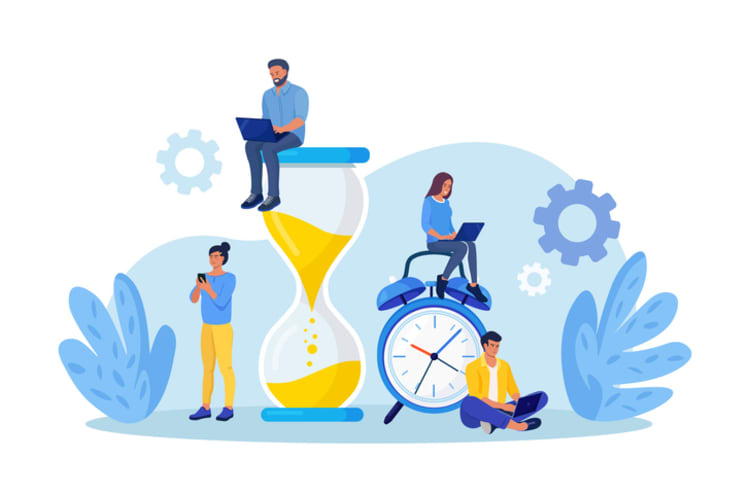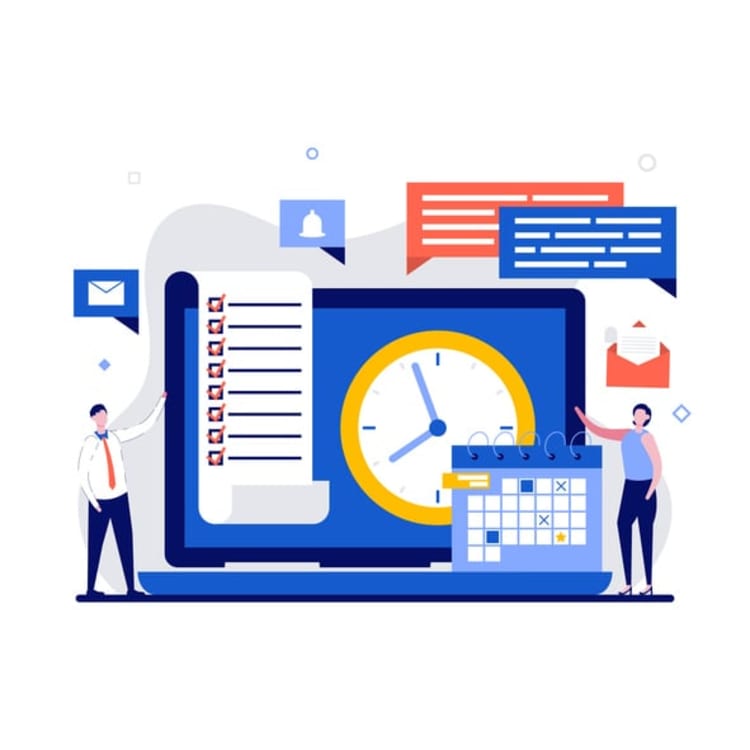Are you constantly racing against the clock, struggling to juggle multiple tasks, and feeling overwhelmed by deadlines? You’re not alone. But what if we told you that mastering effective time management could unlock your full potential and transform your life? The power to achieve greater focus, productivity, and well-being lies within you, waiting to be unleashed. This is why time management methods are important.
In this blog post, we’ll explore the significance of time management methods and the essential skills needed to conquer this vital aspect of daily life. From planning ahead to minimizing distractions and leveraging technology, you’ll discover practical tips and techniques to help you stay on track, achieve your goals, and find that elusive work-life balance, all while understanding why time management is important.
Key takeaways
- Time management methods unlock potential, boosts productivity and enhances work-life balance.
- Master essential skills like task prioritization, delegation & goal setting to maximize success.
- Utilize tech tools & strategies to overcome common challenges and unlock your full potential!
The significance of time management methods

Time management is the cornerstone of success, with countless benefits that extend far beyond productivity. Mastering this critical skill allows for a healthy work-life balance, improved mental well-being, and an efficient version of yourself. So how do you unlock the door to effective time management? Understanding the importance of time management is the first step. Developing better skills in this area can help you become more organized and productive.
Whether you’re a small business owner, freelancer, or simply striving to make the most of your daily life, proper time management methods can help you tackle different tasks efficiently, maximize productivity, and achieve a better work-life balance. From boosting your professional reputation to improving your personal life, the benefits of time management are truly endless.
Boosts productivity
Effective time management methods play a crucial role in boosting productivity. Focusing on essential tasks and minimizing distractions leads to greater focus and the ability to accomplish more in less time. Tackling important tasks first allows you to maintain focus and ensures that you’re working on the most critical tasks, leading to increased productivity and success.
Time tracking apps, such as Toggl and RescueTime, can help you analyze how you’re spending your time and identify areas for improvement. Small adjustments to your daily routine can maximize productivity and make the most of your time, leading to better results and a sense of achievement.
Enhances work-life balance
Juggling work and personal life can be challenging, but with effective time management skills, achieving a better work-life balance is within reach. Prioritizing tasks and delegating responsibilities reduce stress levels and ensure enough time for both professional and personal life.
One of the key advantages of good time management is the ability to create space for relaxation and personal growth. We all need time to recharge our batteries, and by making a conscious effort to manage our time effectively, we can enjoy the benefits of a well-balanced life. Carving out dedicated blocks for work, family, and leisure activities improves well-being and contributes to a healthy work-life balance.
Supports mental health
Good time management methods not only leads to increased productivity but also supports mental health. By reducing stress and anxiety, proper time management can help you maintain a more balanced outlook on life. When we feel overwhelmed by tasks and deadlines, our mental well-being can suffer, leading to decreased productivity and a negative impact on our personal lives.
Addressing stress is essential in time management, as it directly impacts productivity. Implementing practical tips and techniques for better time management, like breaking down tasks into manageable chunks and setting deadlines, combats stress and improves overall mental well-being.
Essential time management skills

Mastering time management involves developing essential skills that can help you reach success. Prioritizing tasks, delegating responsibilities, and setting achievable goals are key components of successful time management, which can lead to less stress and improved outcomes. Honing these skills helps avoid poor time management, and optimizes available time utilization.
Developing effective time management skills requires self-discipline and ongoing practice. From being aware of your time usage to arranging tasks and activities, these skills can help you avoid common pitfalls and ensure that you’re making the most of your time. Regularly reviewing and improving time management skills methods and making necessary adjustments keeps you ahead of the game and helps achieve your goals.
Prioritization
Prioritization is a crucial aspect of effective time management methods. Focusing on urgent and important tasks ensures optimal use of time and resources. The Eisenhower matrix is a helpful tool for prioritizing tasks, allowing you to separate critical tasks from those that can be delegated or eliminated entirely.
Prioritizing urgent tasks helps maintain focus on what’s important, leaving less critical tasks for later. This approach helps you avoid feeling overwhelmed by a never-ending to-do list and ensures that you’re dedicating your time to the tasks that truly matter. In turn, this leads to increased productivity and a greater sense of accomplishment.
Delegation
Delegation is an invaluable tool for maximizing productivity and fostering growth within a team. Assigning specific tasks or responsibilities from one person to another allows for better distribution of workload, empowering team members to take on new challenges and develop their skills. Delegating tasks frees up time for more important ones, enabling focus on the bigger picture.
Small business owners, in particular, can greatly benefit from effective delegation, as it allows them to concentrate on the most important aspects of their business and maximize productivity. Assigning tasks to team members based on their skills and abilities ensures efficient and effective work completion, ultimately leading to a more successful business and helping small business owners achieve their goals.
Goal setting
Goal setting is an essential component of successful time management methods. Setting clear, achievable goals provides direction and motivation, ensuring timely task completion and goal attainment. The process of setting SMART goals (Specific, Measurable, Achievable, Realistic, and Time-bound) can help you stay focused and motivated, leading to better time management and success.
Setting meaningful, achievable goals can help you maintain focus and stay motivated in the face of challenging tasks. Breaking down larger tasks into smaller, manageable goals facilitates steady progress toward objectives and brings a sense of accomplishment. This approach not only helps you manage your time more effectively but also fosters a positive mindset and a can-do attitude.
Time management techniques for success

Implementing proven time management techniques can significantly enhance your productivity and success. Planning ahead, minimizing distractions, and avoiding multitasking maximizes time utilization and eases goal achievement. These techniques not only help you stay organized but also ensure that you’re dedicating the appropriate amount of time and attention to each task.
Incorporating these techniques into your daily routine can transform the way you manage your time, leading to increased efficiency and a greater sense of control over your life. Whether you’re a busy professional or a student trying to juggle multiple responsibilities, mastering these time management techniques can help you stay on track and reach your full potential.
Planning ahead

Planning ahead plays a crucial role in effective time management. Anticipating potential challenges and preparing for future tasks ensures readiness to tackle any obstacles and minimizes the likelihood of last-minute stress. Creating a to-do list, setting deadlines, and allocating time for each task can help you stay organized and ensure that tasks are completed on schedule.
Planning ahead also allows you to:
- Prioritize tasks
- Allocate your time effectively
- Have a clear understanding of upcoming deadlines and commitments
- Make informed decisions about time spent
- Focus on the most important tasks
This proactive approach to time management can lead to improved productivity and a greater sense of achievement.
Minimizing distractions
Minimizing distractions is another key component of effective time management. In today’s fast-paced world, it’s all too easy to get sidetracked by social media, email notifications, and other interruptions that can hinder your productivity. Identifying and eliminating distractions helps maintain focus and optimize time utilization.
One practical strategy to minimize distractions is to designate specific blocks of time for checking email and social media, rather than allowing these activities to interrupt your work throughout the day. This approach can help you stay focused on your most important tasks and ensure that you’re using your time effectively. Creating a distraction-free environment boosts productivity and aids in efficient goal achievement.
Avoiding multitasking
Avoiding multitasking is another essential time management technique for success. While it may be tempting to work on multiple tasks simultaneously, research has shown that multitasking can actually impair productivity and lead to increased stress. Focusing on one task at a time enhances efficiency and leads to better results.
To avoid the pitfalls of multitasking, try dedicating specific blocks of time to each task and resist the urge to switch between tasks until each one is complete. This approach not only helps you maintain focus but also ensures that you’re giving each task the attention it deserves. Prioritizing tasks and staying focused optimizes time utilization and enhances goal achievement.
The role of technology in time management

Technology can play a significant role in time management, helping you stay organized and on track. Time tracking apps and digital calendars are invaluable tools that can assist you in managing your time more effectively, ensuring that tasks are completed on time and priorities are set.
Leveraging technology provides greater insights into time usage, identifies areas for improvement, and helps develop strategies to maximize productivity. Some benefits of using technology for time management and overall efficiency include:
- Setting reminders and notifications
- Syncing schedules with your team
- Tracking and analyzing time usage
- Automating repetitive tasks
- Accessing information and resources quickly and easily
By utilizing these technological tools, you can effectively manage your time and increase your productivity.
Time tracking apps
Time tracking apps, such as Toggl and RescueTime, are powerful tools that can help you:
- Monitor and analyze the time you spend on various tasks and projects
- Capture the time spent on different tasks
- Evaluate your productivity
- Identify time-wasting activities
- Enhance your time management skills
These apps enable you to effectively manage your time and make the most out of your day.
Using time tracking apps provides valuable insights into time spend and aids in making informed decisions about effective resource allocation. This information can help you set more realistic goals, prioritize tasks, and ensure that you’re dedicating the appropriate amount of time to each project. By taking advantage of these tools, you can take your time management skills to the next level and achieve greater success.
Digital calendars
Digital calendars, such as Google Calendar, are essential tools for organizing and scheduling tasks, deadlines, and appointments. Providing a visual representation of tasks and commitments, digital calendars aid in effective task prioritization and planning, ensuring deadlines are met and tasks are completed on time.
In addition to helping you stay organized, digital calendars also offer features such as reminders, notifications, and the ability to sync and share schedules with others. By leveraging these features, you can stay on top of your commitments and ensure that you’re making the most of your time. Digital calendars are an indispensable tool for anyone looking to improve their time management skills and enhance their overall productivity.
Overcoming common time management challenges
Even with the best intentions and time management techniques, we can still face common challenges that hinder our productivity. Procrastination and underestimating time are two such obstacles that can stand in the way of effective time management. Addressing these challenges head-on improves productivity and aids in achieving greater success.
Understanding the root causes of these challenges and implementing strategies to overcome them can help you stay on track and make the most of your time. By breaking down tasks into smaller, manageable chunks and setting deadlines, you can conquer procrastination and ensure that you’re dedicating the appropriate amount of time to each task.
Procrastination
Tackling procrastination involves recognizing the reasons behind it and taking action to overcome it. One effective strategy is to break tasks into smaller, more manageable pieces, making them less daunting and more achievable. By setting deadlines for yourself, you can create a sense of urgency and stay on track.
Another helpful tactic is to reward yourself for completing tasks, providing motivation and encouragement to stay focused and avoid procrastination. By implementing these techniques, you can stay on track, maintain focus, and achieve your goals.
Underestimating time
Underestimating the time required for tasks can lead to inadequate planning, resulting in delays, missed deadlines, and increased stress. To avoid this common pitfall, it’s important to accurately assess the amount of time needed for each task or activity and allocate your time accordingly.
Evaluating the time each task will take allows for creating a more realistic schedule and ensures appropriate time allocation for each project. This approach not only helps you stay on track but also reduces the likelihood of last-minute stress and missed deadlines.
Harnessing the power of Kumospace for effective time management methods

In the digital era, where remote work and virtual collaboration are increasingly prevalent, time management has become a critical skill for personal and professional success. This is where Kumospace, an innovative virtual office platform, steps in to transform how we manage our time in a remote working environment.
Kumospace offers a unique solution to common time management challenges faced in remote work settings. Its interactive platform mimics a physical office space, allowing users to navigate through virtual rooms and engage with colleagues in real-time. This design fosters efficient communication and collaboration, reducing the need for back-to-back virtual meetings that can often lead to Zoom fatigue and inefficient use of time.
The platform's intuitive layout enables users to see who is available and engage in spontaneous conversations, just as they would in a physical office. This immediacy cuts down on the time typically lost in scheduling and waiting for responses to emails or messages. Additionally, Kumospace allows for the creation of dedicated zones for different teams or projects, making it easier to focus on specific tasks without the distraction of unrelated discussions.
Moreover, Kumospace's environment encourages a healthy work-life balance, an often overlooked aspect of time management. By clearly delineating workspaces within the virtual platform, users can mentally separate work from personal time, helping them manage their working hours more effectively and avoid the trap of overworking.
Summary
In conclusion, effective time management is a crucial skill that can significantly enhance your productivity, work-life balance, and mental well-being. By mastering essential time management skills, such as prioritization, delegation, and goal setting, and implementing proven techniques like planning ahead, minimizing distractions, and avoiding multitasking, you can unlock your full potential and achieve greater success in all aspects of your life.
Remember, the journey to better time management is an ongoing process, requiring self-discipline and continuous improvement. By staying committed to honing your skills and leveraging the power of time management methods, you can overcome common challenges and transform your life for the better.
Frequently asked questions
Good time management is essential for greater productivity, lower stress levels and a better quality of life. By taking control of your time, you can get more done in a shorter period, stay focused, and enjoy more time to spend with loved
ones.
Time management can help you maximize productivity, prioritize tasks, reduce stress, organize your schedule, and achieve your goals. With these benefits, taking the time to manage your time is definitely worth it.
Time management is an important skill for students to master as it ensures that they are well-prepared and organized, with the ability to focus on tasks and assignments. It helps to reduce stress by enabling more efficient use of time, and can lead to improved success, though this requires students to change their habits and practice self-discipline.
Improve your time management skills by creating a plan, limiting distractions, establishing a routine, taking micro-breaks, focusing on one task, being organized, and using time management apps. Additionally, determine your priorities, avoid multitasking, learn to say no, organize your day, and take regular breaks to reduce stress.
Technology can help you optimize your time usage, stay on top of tasks and get organized - all keys to successful time management.





